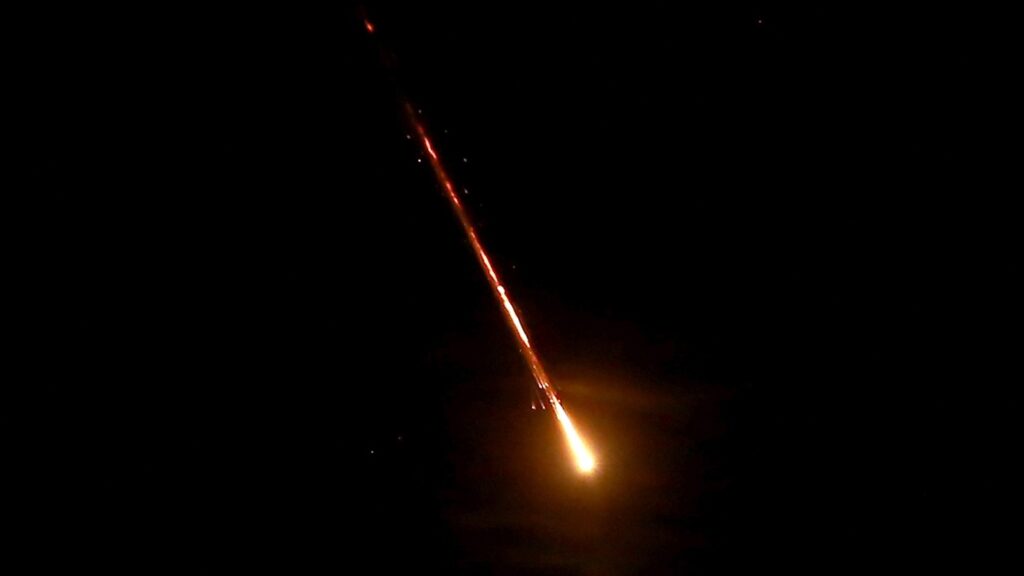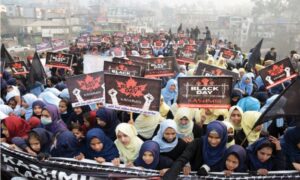
[Middle East Eye]
America aims to drag Jordan into full participation in defending Israel within a Western alliance, reports Mohammad Ersan in Amman.
Jordanian authorities faced a deluge of criticism on Wednesday after the government confirmed that its forces downed Iranian missiles targeting Israel the night before.
Iran fired at least 180 missiles at Israel late on Tuesday, with missiles lighting up the night skies above Tel Aviv and Jerusalem before the deafening sound of large explosions rang out.
Videos seen by Middle East Eye showed missiles striking several parts of Israel, with one appearing to explode in the vicinity of the Mossad headquarters on the northern outskirts of Tel Aviv. It was unclear if there was any damage to the facility.
A number of impact sites were also identified across central Israel, but Israel’s military censor, as a matter of policy, has barred local and international media outlets from publishing the details of the exact locations targeted.
In a statement late on Tuesday, Jordan’s Public Security Directorate confirmed that its air defences intercepted missiles and drones heading for Israel.
“The Royal Jordanian Air Force and air defence systems responded to a number of missiles and drones that entered Jordanian airspace,” a statement read.
One video seen by MEE showed a downed Iranian missile embedded in a road on the outskirts of the capital, Amman.
Following the attacks, Jordanian officials insisted the kingdom’s involvement was a matter of self-defence and protecting its sovereignty.
“Jordan’s position is clear and permanent that it will not be an arena for conflict for any party,” Mohammad al-Momani, a government spokesman and minister of state for media affairs, said in a statement, adding that protecting Jordanians was the kingdom’s “first responsibility”.
But the remarks did not go down well in Jordan, a country which boasts one of the highest populations of Palestinian refugees.
“If Jordan comes first, why is it being dragged into a confrontation that is not its own?” Iyad al-Rantsis, a Jordanian national, told MEE.
“Why are the Jordanian citizens exposed to dangers for the sake of the Zionists and their security and safety?” he said.
“Moreover, why is Jordan exhausting its forces and economy by shooting down missiles that are not directed at it?” he added.
The portrayal of Jordan as an ally and protector of Israel appears to have also angered many others in Amman who, for months, have expressed outrage over the war on Gaza.
“What we witnessed yesterday was a contradiction in positions,” Mohammed al-Absi, a member of the Democratic Unity Party (Wehda) and coordinator of the Movement to Resist Normalisation, told MEE.
“There was a popular sentiment that rejoiced at the Iranian missiles striking the Zionist entity [Israel]. However, shooting down Iranian missiles does not align with the popular position supporting the resistance in Palestine and Lebanon,” he said.
“What happened with the downing of the missiles was unfortunate, whether they were shot down by Jordanian or foreign air defences. These missiles did not target Jordan, so why are we shooting them down?” he added.
Lamis Andoni, an analyst and commentator on Middle Eastern and Palestinian affairs, agreed, saying Jordan, a recipient of US aid which routinely collaborates with Washington, was forced to intervene and was operating under American pressure.
“The Jordanian government considers the passage of missiles and drones over its territory a violation of its sovereignty, but at the same time, it does not consider Israeli and American aircraft that penetrate its airspace to strike an Arab country or Iran a violation of its sovereignty,” she said.
“America aims to drag Jordan into full participation in defending Israel within a Western alliance. This has officially pulled Jordan into defending Israel,” she added.
Relations
Jordan established diplomatic relations with Israel in 1994, and the countries are known to cooperate on numerous regional security issues that extend beyond the occupation of Palestine.
But, since the war on Gaza erupted, a growing number of Jordanians have become critical of the government’s peace treaty with Israel, despite Amman pushing for a ceasefire and repeatedly publicising its aid distribution efforts in the besieged enclave.
In late March, thousands of Jordanians demonstrated in Amman on a nightly basis, with some trying to storm the Israeli embassy. And in September, the Islamic Action Front (IAF), which has led large protests against the war on Gaza, made significant gains in parliamentary elections, winning 32 seats in the 138-seat parliament that has long been dominated by tribal and pro-government factions.
Still, some pro-government supporters defended the decision to intercept the missiles, saying they were in line with Amman’s security interests.
“These missiles crossed Jordanian airspace without coordination or notification to the kingdom, and we are a sovereign country,” Nidal Abu Zeid, a military expert and political analyst, told MEE.
“The missiles that fell in Jordan were the missile casing, not the explosive warhead, and this means that the air defence systems dealt with the missile that exploded in the air,” he said.
The analyst said that some of the missiles were shot down by Jordanian air defences and others by the Israeli “David’s Sling” or by US air defences based in the region and on the USS Dwight D Eisenhower aircraft carrier.
“Therefore, these missiles were shot down outside Jordanian airspace in the upper layers of the atmosphere and then fell inside Jordan.”


